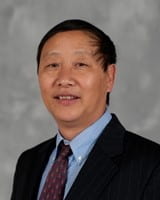Education
|
 |
Research Interests
Dr. Deng’s research interests are renewable energy, nanomaterial synthesis and self-assembling, biofuel and biomass materials, colloid and interface science and engineering, polymer synthesis, and papermaking.
For the first time, Dr. Yulin Deng’s group reported a novel fuel cell that directly consumes natural polymeric biomasses, such as starch, cellulose, lignin, and even switchgrass and wood powders. This fuel cell combines some features of solar cells, fuel cells, and redox flow batteries. Specifically, the polyoxomatelate forms a charge transfer complex with the biomass by either absorbing solar light or heat energy. The complex release their electrons to anode. These electrons pass through anode to cathode where oxygen captures the electrons. Unlike most cell technologies that are sensitive to impurities, the cell reported in this study is inert to most organic and inorganic contaminants present in the fuels. The fuel cell is completely noble metal free. The similar system was investigated for low temperature hydrogen production using native biomass directly. The detail reports of biomass fuel cell can be found at
http://www.natureworldnews.com/articles/6077/20140218/low-temperature-fuel-cells-run-biomass.htm
and
http://www.nature.com/ncomms/2014/140207/ncomms4208/abs/ncomms4208.html
Biofuel is another interested research area of Dr. Deng’s research group. Novel pretreatment of lignoncellulose for biofuel production was one of Dr. Deng’s research areas. Low temperature catalytic depolymerization of lignin for fuel applications has been an actively research area.
Biodegradable cellulose nanocrystals (CNC) and cellulose nanofibrils(CNF) are also interested in Dr. Deng’s research. Shape-memory aerogels, aerogel microspheres, nanocellulose based soft electronics, gas and liquid barrier films have been discovered by Dr. Deng’s research group recently.
One-dimensional nanomaterials, including ZnO, TiO2, Mg(OH)2, Au, conductive polymer, and two-dimensional nanomaterials with ordered patterns are Dr. Deng’s research interesting areas. The unique applications of one- and two-dimensional nanomaterials in sensor, solar cell, supercapacitors, and polymer composites have been focused.
Hollow structures inorganic materials, such as TiO2 and polymer materials, such as poly(iso-propyl acrylamide) have been synthesized. These unique nanomaterials can be used in many applications including drug delivery, solar cell, etc.
Pulp and paper science and engineering have been a long research area in Dr. Deng’s research career.
Dr. Deng is an elected Fellow of the International Academy of Wood Science, a member of AIChE and TAPPI. He received several awards, including AIChE Forest Bioproducts Division Chase Award, IPST President Research Award. He serves editorial board member for 5 journals, and associate editor for 2 journals.